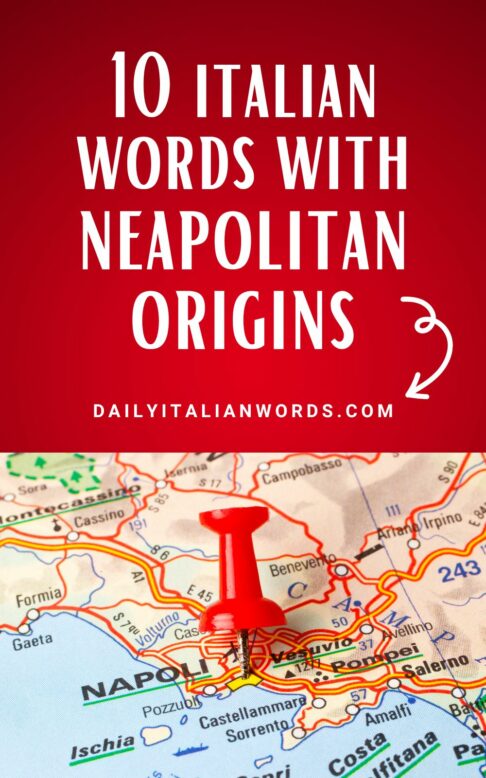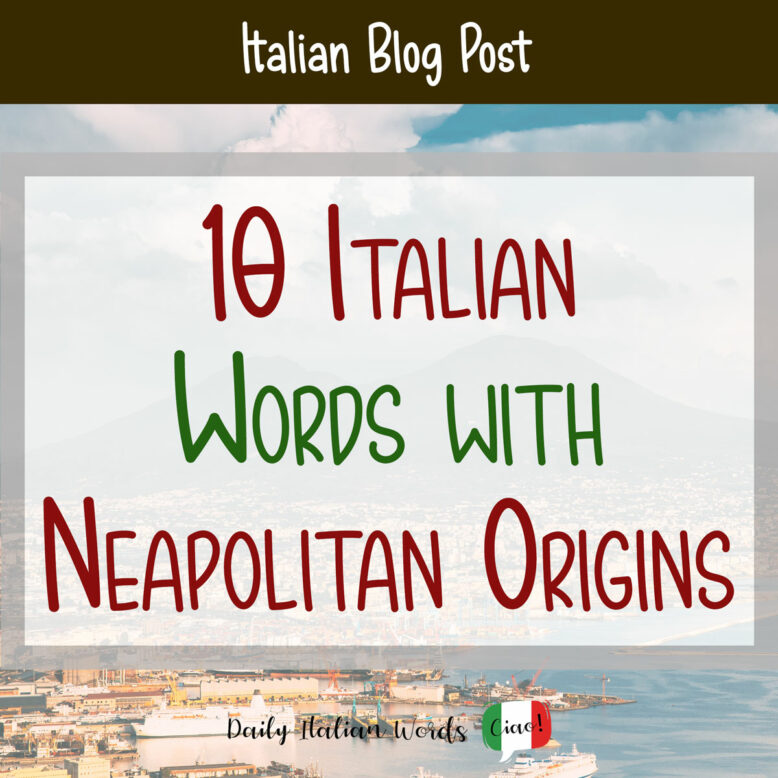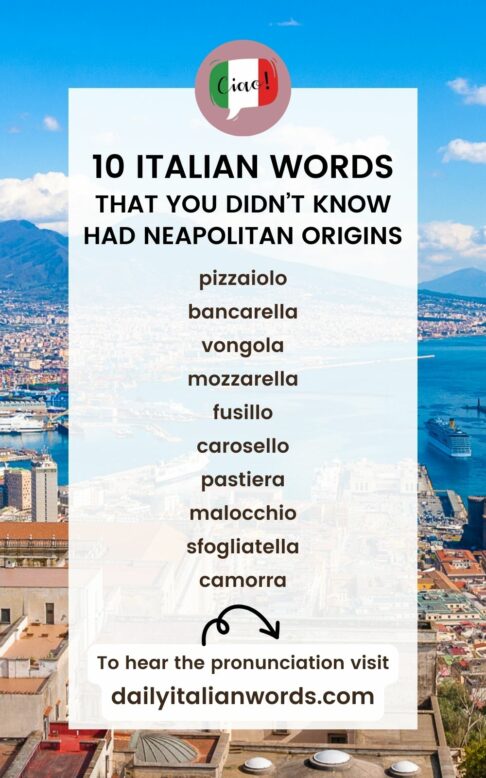The Italian language, as is well known, is a Romance language and the offspring of the Latin language, following years of evolution over the centuries, from Ancient Rome until the present day. However, like many of the most spoken languages in the world, the Italian language has undergone many changes.
It has developed through lexicon blending, the absorption of vocabulary from foreign domains, and regional dialectal shifts. For this reason, the Neapolitan lexicon has also contributed to the expansion of the Italian vocabulary, particularly in recent centuries.
Here are 10 of the most renowned words of Neapolitan origin that are widespread not only in Italy but also sometimes worldwide. Don’t believe it? Keep reading then.

1. Pizzaiolo
It is easy to understand why the term “pizzaiolo” is widely used throughout Italy. It originated in Naples and refers to a specialized person, usually a man, who crafts artisanal pizzas. It is important to note that being a pizzaiolo is more than just a profession for Neapolitans—it is a way of preserving a tradition and culinary art that revolves around artisanal skills and local cuisine.
In Italy, the term “pizzaiolo” is specifically used for individuals who make pizza in a traditional manner. It does not encompass those working in commercial chains or bars. A pizzaiolo, or “pizzaiuolo” in Neapolitan dialect, is considered a master of pizza.
Around the world, especially in places where Italian immigrants have settled in the past, you will often find that “pizzaiolo” is used instead of “pizza makers.” Pay attention to this distinction the next time you go out for pizza.

2. Bancarella
Linguists have encountered some challenges in tracing the origins of words that have become common in Italian vocabulary, and “bancarella” is one such word. It has been discovered that this term was widely used in the region of Campania, particularly in Naples, before spreading throughout Italy.
Specialists have also noted that this term, which refers to a stall in a local market, could potentially have been imported from the Ancient Germanic language. It appears that the Neapolitan dialect adopted this term from “bank,” but debates regarding its exact origin are still ongoing.
3. Vongole
One of the most fascinating words is undoubtedly “vongola,” which translates to “clam” in English. It originated in the Neapolitan dialect, but nowadays it has shed its regional connotation and become standardized in Italian.
The true origin of “vongola” can be traced back to the Latin language, specifically from “conchula,” a diminutive form of “concha,” meaning “conchiglia” or “shell” in English. However, how did linguists determine that this word came from Neapolitan? It was actually quite simple. Neapolitan is the only Italian dialect that transforms the phoneme “c” into a “v.” This distinctive phonetic mutation provided clear indications for linguists to make this connection.

4. Mozzarella
Mozzarella is a renowned delicacy that originates from Campania. This traditional product is made from buffalo milk, sourced from local farms, and has gained popularity throughout Italy. Its production initially began in the surrounding regions before expanding across the country.
The term “mozzarella” is derived from the Italian verb “mozzare,” which means “to chop off.” This refers to the process involved in the production of mozzarella. To achieve the desired consistency, the milky compound is repeatedly chopped off until the mozzarella reaches its renowned texture.
5. Fusillo
This particular type of handmade pasta originated outside the Parthenopean region. However, its name was coined in Campania, where it gained widespread acceptance and eventually spread throughout Italy. This distinctive pasta variety features a tapered shape with a spiral line, resembling a long screw.

6. Carosello
The term “carusiello” originated from an even older term. It was initially used to refer to money boxes, which were commonly made of clay during that era. Over time, the word has fully integrated into the Italian lexicon, retaining its original meaning of a container for storing money or valuables.
7. Pastiera
This delightful dessert, traditionally made for Carnival and Easter celebrations, originated in Naples and has gained popularity across almost every region of Italy due to its exquisite nature. It can now be found in numerous shops, particularly pastry shops.
In Naples, this dessert is available year-round and can be found throughout the city. It is made with ingredients such as ricotta cheese, wheat seeds, eggs, and various flavors, resulting in a truly delicious and sweet treat.

8. Malocchio
The concepts of the evil eye, curses, and omens have deep roots in the history of Campania. Even today, it is possible to encounter women who read people’s futures and pasts using tarot cards. Occasionally, if you fail to adequately reward them, they may cast a hex upon you. The word “malocchio,” which translates to “hex” in English, was initially found in Neapolitan and other local dialects in the southern part of Italy. Over time, the word became widely used throughout the entire Italian Peninsula and continues to be in common usage today.
9. Sfogliatella
Indeed, sfogliatella is another popular breakfast dessert commonly enjoyed in pastry shops and bars. Unlike the pastiera, however, sfogliatella is not as widely known throughout Italy. Nonetheless, in various regions, you can still find establishments where sfogliatella is sold, albeit less commonly.
Sfogliatella is made with a filling of ricotta cheese and candied fruit, encased in a crispy, flaky pastry shell. It is a special treat to kickstart your day, although it is known to be quite high in calories due to its rich ingredients and preparation.

10. Camorra
Unfortunately, Naples also has its dark side, primarily associated with the presence of the Camorra, an organized crime syndicate that operates locally and extends its activities beyond regional borders.
The Camorra is notorious worldwide and is involved in various illegal activities. It has been depicted in the TV series “Gomorra,” which offers a portrayal of its operations and the shady business practices employed by this criminal organization. The series provides an insight into how the Camorra operates and the impact it has on the community.

Conclusion
Indeed, tracing the origins of the Italian lexicon can be a complex task. Linguists have discovered that Italian has borrowed words from over 16 different languages, including Chinese, Persian, Hindi, Sanskrit, Hebrew, and even the Lombard language.
This diversity of linguistic influences poses significant challenges for linguists in their daily work. However, interestingly, there are instances where borrowed words have come from very close sources, to the extent that they have become deeply integrated into the Italian language and are used consistently throughout Italy.

About the author: Fabio Guarino
As a Linguist and Language Specialist, working as a Freelance Content Writer and SEO Marketer allows me to combine my passions and interests with my career. My favourite thing about working with languages is playing with words. And this is something I’ve always dreamed about since I started to wander the globe and study languages.

Fabio Guarino is a Linguist and Language Specialist who operates as a Freelance Content Writer and SEO Marketer. He considers himself fortunate to be able to blend his passion for his native language, Italian, along with English and Spanish, with his career.


